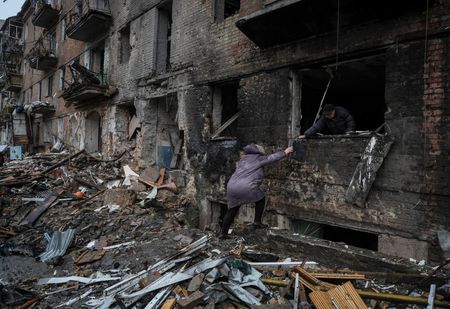By Marc Jones
LONDON (Reuters) -Ukraine’s Finance Minister Serhiy Marchenko has said more Western support is needed to help it meet its growing reconstruction costs following this week’s escalation of Russian missile attacks.
A blitz of Russian strikes in recent days have caused Kyiv’s biggest power outages of the nine-month long war and shut down all of Ukraine’s nuclear power plants for the first time in 40 years.
In August the World Bank estimated it would take $105 billion to repair Ukraine’s physical infrastructure but Marchenko told Reuters that number was rising.
“Unfortunately this number grows every day and in the worst case scenario will increase significantly,” he said in emailed comments.
Marchenko added current Western support meant “we’ll have approximately $3 to 3.5 billion a month vs $5 billion this year,” which should be enough to keep the government running.
However, he said the current budget includes little for reconstruction costs which it needs to increase if possible.
Some senior European officials have estimated it is likely to cost more than one trillion euros to rebuild Ukraine after the war, which on Thursday entered its tenth month.
For now, though, Western support continues to come in waves.
The United States authorized $400 million in military aid this week. Group of Seven (G7) foreign ministers will discuss ensuring Ukraine’s energy supply next week, German Foreign Minister Annalena Baerbock tweeted on Thursday.
The International Monetary Fund said on Wednesday it had reached a provisional “staff level” agreement for a policy programme monitoring arrangement. Ukraine hopes the move will lead to a full-fledged programme of support worth tens of billions of dollars.
“The support from our international partners is essential for us,” Marchenko said, also pointing to 18 billion euros ($18.73 billion) promised by the European Union.
DEBT MEASURES
Ukraine this year had requested a $15 to $20 billion IMF programme, but the Fund’s debt sustainability requirements prevented its approval. Instead, a $1.3 billion emergency deal was struck under the IMF’s new food and energy crisis programme.
IMF faces the impossibility of forecasting Ukraine’s economic capacity or reconstruction needs for the time being, or how much debt it could afford to finance.
In August, Marchenko won an agreement from the country’s international creditors, including Western governments and major investment firms, for a two-year debt payment freeze.
Ukraine was “still in the situation of full unpredictability,” he said, although it still plans to remove some of the capital controls it put in place to stabilise its finances.
It would mean that from April bond investors who have been unable to access their money during the war will receive some payments again, although Marchenko urged them to reinvest that cash back into Ukraine by buying its longer-term bonds.
“We are counting on this channel to be the first to bring the private capital flows back to the country,” he said.
($1 = 0.9609 euros)
(Reporting by Marc JonesEditing by Gareth Jones and Josie Kao)





